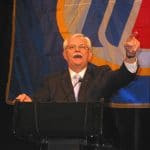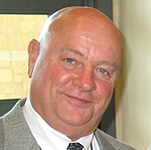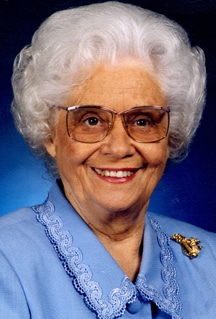SAN FRANCISCO — In response to UTU International President Mike Futhey announcing the flawed merger attempt with the Sheet Metal Workers International Association “dead,” some 800 UTU members at a western regional meeting here July 8 responded with thunderous applause, foot-stomping, cheering and whistling.
“There will not be a merger today. There will not be a merger tomorrow. There will never be a merger with the Sheet Metal Workers,” Futhey told the loudly supportive International vice presidents, general chairpersons, state legislative directors, delegates, local officers and leaders in training while delivering his state of the union message.
Futhey described 18 painful months of frustrating talks with the Sheet Metal Workers International Association (SMWIA) leadership, and hundreds of thousands of dollars in court costs incurred as a result of the flawed merger that was initiated by a previous administration.
Implementation of the merger was halted by a federal district court in December 2007, prior to Futhey taking office.
In issuing, first, a temporary restraining order against the merger, and then a preliminary injunction, the federal court ruled that the UTU membership had not been permitted an informed vote when the merger question first was put out for ratification in mid-2007.
If the merger were to be restarted, said Federal Judge John Adams, a constitution for the merged organizations would have to be written and then submitted to the UTU membership for ratification — a process that was ignored when the initial merger ballot was sent to the membership in 2007 by a previous administration.
Among crucial facts withheld from the membership was that UTU’s cherished craft autonomy would be eliminated upon implementation of the merger.
In an attempt to lawfully restart the merger process — as suggested by the federal court — Futhey sought to engage the SMWIA to write the constitution that would govern a merged SMWIA and UTU.
“I have gone to the SMWIA time and time again to put a constitution together and protect the interests of UTU members,” Futhey said. “I met a stone wall each time.” He said the UTU’s insistence that craft autonomy be preserved in any merger was met by a SMWIA response that craft autonomy “can’t be accepted.”
Futhey said that when he took the UTU Board of Directors to a meeting with the SMWIA leadership in Washington — asking, “What will it take to put the constitution together” — the UTU was again rebuffed. The UTU board “overwhelmingly” said, “let’s walk away,” Futhey reported.
The federal court injunction against the merger is currently on appeal before the U.S. Sixth Circuit Court of Appeals, with no time limit on when a decision might be reported out.
UTU: A UNION MOVING FORWARD
Futhey, in his state of the union message, said that in the 18 months since his administration has taken office, the finances, organizing efforts and image of the UTU have improved markedly.
The balance of the UTU general fund has almost doubled over the past 18 months, Futhey said, while the UTU Insurance Association surplus has climbed to $23 million, the Discipline Income Protection Plan is back in the black, the strike fund has grown by 45 percent, and necessary funds will be available for the 11th quadrennial convention in 2011.
Futhey reported that more than 300 pilots and flight attendants employed by Great Lakes Airlines have voted to be represented by the UTU; that more than 80 percent of some 110 pilots with Lynx Aviation have signed authorization cards seeking UTU representation; and the UTU is working to organize an even larger airline.
Increased organizing among bus-industry employees is further improving the UTU’s image — especially within the AFL-CIO — as a transportation union “moving forward,” Futhey said.
The UTU especially has gained stature among other transportation unions as a result of President Obama nominating two UTU officials for senior federal agency leadership roles, Futhey said.
Former UTU Illinois State Legislative Director Joe Szabo was confirmed by the Senate as the nation’s federal railroad administrator, and UTU Associate General Counsel Dan Elliott was nominated by President Obama July 7 to be chairman of the U.S. Surface Transportation Board.
COLLABORATING WITH TRANSPORTATION LABOR
The UTU, Futhey said, also worked jointly with other transportation unions on behalf of successful Senate confirmation of former Association of Flight Attendants President Linda Puchala to be a member of the National Mediation Board, and former Air Line Pilots Association President Randy Babbitt to be federal aviation administrator.
The UTU PAC is essential to gaining labor- and UTU-friendly legislation, Futhey said, pointing to efforts underway to achieve new bus- and airline-safety legislation, and passage last year of the most comprehensive rail safety bill in more than a generation.
“The [rail safety] bill goes farther than we wanted [in some respects] and we may need further legislation to fix what wasn’t contemplated,” he said. And, once again, the UTU PAC will play a crucial role in that effort, Futhey said.
MESSAGE FOR CARRIERS
Futhey also had a message for carriers seeking unilaterally to change labor contracts using elements of the safety bill as an excuse, rather than negotiate changes as contemplated by the legislation. “We will defend our contracts,” Futhey said.
He also said the UTU would “not tolerate” carrier intimidation and harassment of members, and is moving on multiple fronts — in collaboration with the Brotherhood of Locomotive Engineers and Trainmen — to ensure a minimum of two crew members on all trains, including switching operations in conventional and, especially, remote control modes.
UPCOMING SECTION 6 NOTICES
Futhey said that in advance of Railway Labor Act Section 6 notices being served in November — to begin a new round of national rail negotiations on wages, benefits and working conditions — UTU members will soon be asked for contract-change suggestions, and that a draft of Section 6 demands will be prepared for final determination in October by the autonomous UTU Association of General Chairpersons.
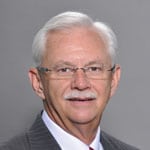
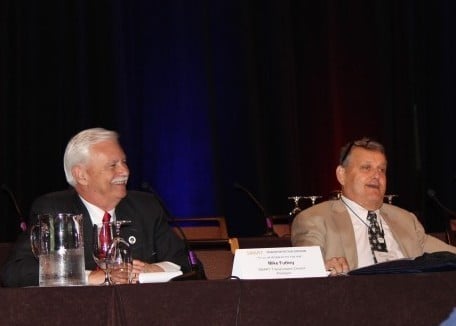 SMART Transportation Division President Mike Futhey, left, and
SMART Transportation Division President Mike Futhey, left, and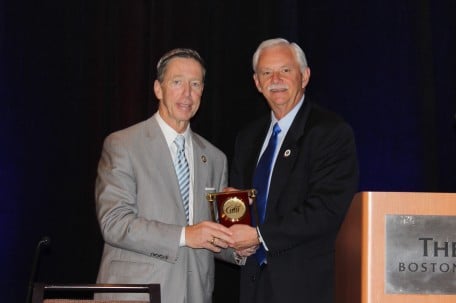 U.S. Rep. Stephen Lynch of Massachusetts receives a UTU clock from
U.S. Rep. Stephen Lynch of Massachusetts receives a UTU clock from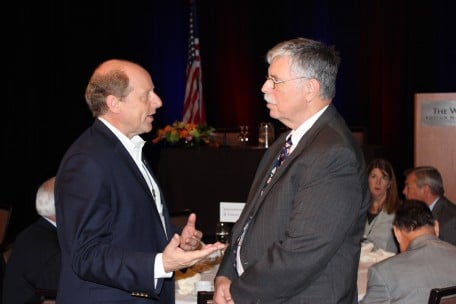 Minnesota State Legislative Director Phillip Qualy speaks with Amtrak President and
Minnesota State Legislative Director Phillip Qualy speaks with Amtrak President and